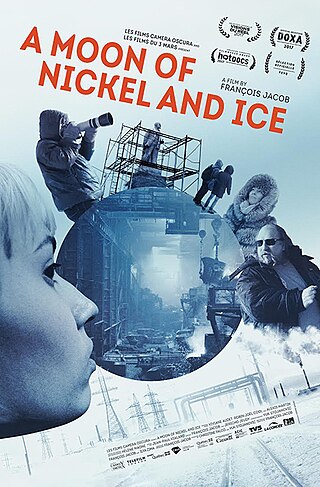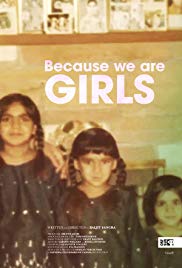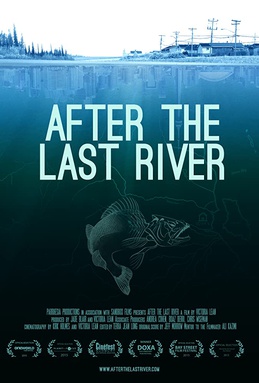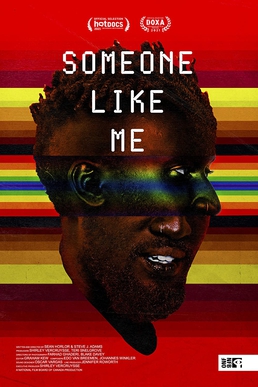Bear 71 is a 20-minute 2012 interactive National Film Board of Canada (NFB) web documentary by Leanne Allison and Jeremy Mendes about a female grizzly bear in Banff National Park named Bear 71, who had a tracking collar implanted at the age of three and was watched via trail cameras in the park from 2001 to 2009. The documentary follows the bear, exploring the connections between the human and animal world, and the far-ranging effects that human settlements, roads and railways have on wildlife.

A Brony Tale is a 2014 Canadian-American documentary film directed by Brent Hodge. The film explores the brony phenomenon, the adult fan base of the children's animated show My Little Pony: Friendship Is Magic that arose shortly after its premiere in 2010. The film is structured around the journey of Ashleigh Ball, one of the principal voice actresses for the show, including her initial reactions to learning of this older fanbase, and her travel as a Guest of Honor to one of the first fan conventions BronyCon held in New York City in 2012. Hodge, a close friend of and previous collaborator with Ball, was curious as she was as to this phenomenon and opted to film her travel and appearance at the convention for the documentary.

Emergency Room: Life + Death at VGH is a medical documentary series which premiered on British Columbia's Knowledge Network on January 21, 2014. It follows doctors, nurses and staff at Vancouver General Hospital (VGH) as they cope with real patients from the Greater Vancouver Regional District. VGH is the second largest hospital in Canada and British Columbia's only level I trauma centre. Stories of stabbings, car accidents, heart attacks, and life-threatening disease are shown alongside everyday cuts and sprains, drunks, and other minor cases, and episodes contain graphic images of wounds, blood, and/or routine and invasive medical procedures.
The Prison in Twelve Landscapes is a Canadian documentary film, directed by Brett Story and released in 2016. Consisting of twelve short vignettes, the film explores the social impact of the prison–industrial complex in the United States through various angles, including a former industrial town in Kentucky which is now dependent on a federal penitentiary for local employment, a community park which was constructed solely to prevent registered sex offenders from being able to move into the local halfway house, and a man who runs a business selling items to family members of prisoners for inclusion in care packages.

A Moon of Nickel and Ice is a 2017 Canadian documentary film, directed by François Jacob. The film profiles history and culture of the isolated Russian mining city of Norilsk.

nîpawistamâsowin: We Will Stand Up is a Canadian documentary film, directed by Tasha Hubbard and released in 2019. The film centres on the 2016 death of Colten Boushie, and depicts his family's struggle to attain justice after the controversial acquittal of Boushie's killer. Narrated by Hubbard, the film also includes a number of animated segments which contextualize the broader history of indigenous peoples of Canada.

Because We Are Girls is a Canadian documentary film, directed by Baljit Sangra and released in 2019. The film centres on Jeeti, Kira and Salakshana Pooni, three Punjabi Canadian sisters from Williams Lake, British Columbia who have gone public in adulthood about allegations of childhood sexual abuse by a cousin who frequently babysat them as children.

Alex Sangha is a Canadian social worker and documentary film producer. He is the founder of Sher Vancouver which is a registered charity for lesbian, gay, bisexual, transgender, queer, and intersex (LGBTQI+) South Asians and their friends. Sangha was the first Sikh to become a Grand Marshal of the Vancouver Pride Parade. Sangha received the Meritorious Service Medal from Governor General Julie Payette in 2018 for his work founding Sher Vancouver. Sangha's first short documentary film, My Name Was January, won 14 awards and garnered 66 official selections at film festivals around the world. Sangha's debut feature documentary, Emergence: Out of the Shadows, was an official selection at Out on Film in Atlanta, Image+Nation in Montreal, and Reelworld in Toronto. The film was the closing night film at both the South Asian Film Festival of Montreal and the Vancouver International South Asian Film Festival where it picked up Best Documentary. Emergence: Out of the Shadows also had a double festival premiere at the KASHISH Mumbai International Queer Film Festival and the Mumbai International Film Festival during the same week, where it was in competition at both film festivals for Best Documentary. The film also had an in-person and online screening at the 46th annual Frameline: San Francisco International LGBTQ+ Film Festival which is "the longest-running, largest and most widely recognized LGBTQ+ film exhibition event in the world."

After the Last River is a Canadian documentary film, directed by Victoria Lean and released in 2015. The film centres on the humanitarian crisis facing the Attawapiskat First Nation in the early 2010s, culminating in chief Theresa Spence's widely publicized hunger strike.
The Borsos Competition is the main awards program for Canadian feature films screening at the annual Whistler Film Festival. Introduced for the first time in 2004, the juried competition presents six awards annually to honour films, actors, screenplays, directors, cinematographers and editors in Canadian cinema. Initially, only films that were having their world premieres at Whistler were eligible for the competition, although this requirement was soon dropped as the festival had difficulty attracting entrants who were willing to forego larger film festivals such as TIFF or the FNC, and thereafter films selected for competition only had to be a regional premiere within the Western Canada region.
The Whistler Film Festival Documentary Award is an annual juried award, given by the Whistler Film Festival to the film selected as the year's best documentary film in the festival program.
Wintopia is a Canadian documentary film, directed by Mira Burt-Wintonick and released in 2019. Originally conceived as an attempt to complete Utopia, an unfinished documentary film her father, Peter Wintonick, was working on at the time of his death in 2013, the film instead evolved into a personal essay on her relationship with him.

Someone Like Me is a Canadian documentary film, directed by Steve J. Adams and Sean Horlor and released in 2021. The film centres on Drake, a gay man from Uganda who moves to Vancouver, British Columbia as a refugee, and the group of Canadians who have agreed to sponsor him through Rainbow Refugee; it documents his arrival in Vancouver and his adaptation to Canadian life, including friction among his sponsors when all he wants to do is celebrate his new freedom by partying, and the emergence of the COVID-19 pandemic as a complicating factor.
The Colin Low Award is an annual Canadian film award, presented to honour the best Canadian documentary film screened at that year's DOXA Documentary Film Festival. The award frequently, but not always, presents an honorable mention in addition to the overall winner.
The DOXA Feature Documentary Award is an annual Canadian film award, presented to honour the best international feature documentary film screened at that year's DOXA Documentary Film Festival. The award frequently, but not always, presents an honorable mention in addition to the overall winner.
The DOXA Short Documentary Award is an annual Canadian film award, presented to honour the best short documentary film screened at that year's DOXA Documentary Film Festival. The award frequently, but not always, presents an honorable mention in addition to the overall winner.
The Nigel Moore Award for Youth Programming is an annual Canadian film award, presented to honour the best documentary film of interest to youth audiences screened at that year's DOXA Documentary Film Festival. The award frequently, but not always, presents an honorable mention in addition to the overall winner.
Brett Story is a Canadian documentary filmmaker, most noted for her 2016 film The Prison in Twelve Landscapes.
Julia Ivanova is a Russian-born Canadian documentary filmmaker based in Vancouver, British Columbia. She is most noted for her films Family Portrait in Black and White, which won the award for Best Canadian Feature Documentary at the 2011 Hot Docs Canadian International Documentary Festival and was a shortlisted Genie Award nominee for Best Feature Length Documentary at the 32nd Genie Awards in 2012, and Limit Is the Sky, which won the Colin Low Award at the 2017 DOXA Documentary Film Festival.








